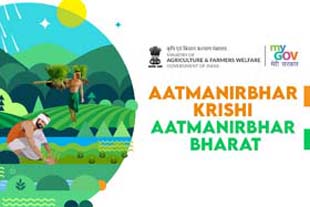Introduction
Krishi Vigyan Kendra (Farm Science Centre) is an innovative science based institution which was given shape by Indian Council of agricultural Research (ICAR) after recommendation of Mehta Committee (1973) with prime mandate to impart vocational training to the farmers and field level extension workers. Accordingly, in the proposal it was recommended to have one Krishi Vigyan Kendra in every district of Indian Union for effective transfer of technology developed in the laboratory for the field application at farmer's level. The concept of vocational training in Agriculture through KVK grew substantially due to greater demand for improved agricultural technology by the farmers. They not only required knowledge and understanding of the intricacy of technologies but also progressively more and more skills in various complex agricultural operations for adoption on their farms. The effectiveness of the KVK was further enhanced by adding the activities related to on-farm testing and frontline demonstration on major agricultural technologies in order to make the training of farmers location specific, need based and resource. The training programmes were designed to impart the latest knowledge to the farmers through work experience by applying the principles of teaching by doing and learning by doing. The prime goal of KVK is to impart training as per needs and requirements in agriculture and allied enterprises to all farmers, farm women and farm youths including school dropouts in the rural areas for self employment and enhancing the productivity. While designing the courses the concept of farming system as well as farming situation are taken into account to ensure that the enterprises in which they are trained and commercially and ecologically viable, sustainable and profitable. Such vocational trainings help them to sustain themselves through self employment and to make them self reliant economically and thus discourages them to migrate to the urban areas. KVK provides training not only in Agriculture and allied vocations but also in other income generating activities that may supplement the income of farm families. The methods employed in training could be formal and informal or a combination of both, depending upon the needs and training emphasis remains to be on work experience, as suggested by Dr. Mohan Singh Mehta committee Report(1970) ie. “The programme should be operated as a plan of continuing education both in the technical and general sense”.
The Broad Objective of Krishi Vigyan Kendra:
i) To promptly demonstrate the latest agricultural technologies to the farmers as well as extension workers of State Departments of Agriculture/Horticulture/Fisheries/Animal Science/Non Government Organizations with a view to reduce the time lag between the technology generation and its adoption.
ii) To test and verify the technologies in the socio-economic conditions of the farmers with a view to study the production constraints and to modify the technologies to make them appropriate.
iii) To impart training to the practicing farmers/farm women, rural youth and field level extension functionaries by following the method of "teaching by doing" and "learning by doing".
iv) To back up with training and communication support to the district level development departments, viz., Agriculture/Horticulture/fisheries/Animal Science and Non Government Organizations in their extension programmes.
Role of KVK in changing perspectives of global agricultural scenario
i) In the eve of globalization and changing nature of agricultural systems, KVK will assess and refine different technologies for farmers and assist them to choose the technologies to be adopted in their system.
ii) Management of the new technologies at farmers level and providing feed back to the research system for refinement.
iii) Helps in proper utilization of man made and natural resources.
iv) Diversification of agricultural system
v) Adoption of need and market based farming systems
vi) Increasing the risk bearing capacity of farmers by popularizing group or collaborative approaches and integration of farming systems.
vii) Effective forward and backward linkages.
viii) Protection of farmers' right and educating them about trade treaties and preparedness required for the change.
List of Head of Krishi Vigyan Kendra, Nagaon since inception
|
Sl. No. |
Name |
Period |
|
1 |
Dr. Bhubaneswar Barman (i/c) |
01-04-2004 to 10-06-2007 |
|
2 |
Dr. Kiran Chandra Deka |
11-06-2007 to 16-07-2009 |
|
3 |
Dr. Tulsi Prasad Saikia(i/c) |
17-07-2009 to 13-09-2011 |
|
4 |
Dr. Mrinal Saikia |
14-09-2011 to 26-06-2012 |
|
5 |
Dr. Biswajit Guha (i/c) |
27-06-2012 to 30-06-2015 |
|
6 |
Dr. Niranjan Deka |
01-07-2015 to till date |
